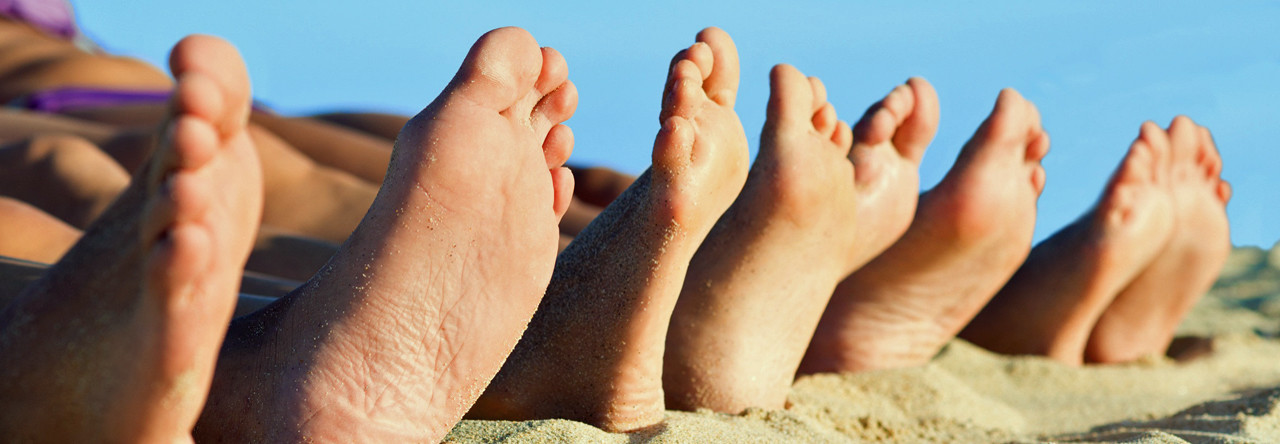Swollen feet, sometimes called edema, is a condition where the muscles in the feet have an excessive buildup of fluid. Gravity pulls the fluid to your ankles and feet.
Swelling can be a symptom of a serious underlying problem, be it a sports injury, pregnancy, heart disease, fluid retention, kidney problems or another condition. If your feet swell chronically, is accompanied by shortness of breath or weight gain, see your doctor.
Slight swelling of the lower legs commonly occurs in warm summer months. Slight swelling is more likely to occur if a person has been standing or walking a lot.
Traditional treatment might include any or all of these suggestions:
Elevate your feet and legs. Place a pillow under your heels, and prop your feet on a chair or high stool. Use a leg wedge to elevate while sleeping.
Dip your feet into a tub of cold water or sit on the side of the bath with your feet under a cold-water tap. After this put your feet up for a while.
Reduce your salt intake. Salt causes you to retain water.
Do not abuse laxatives.
Take diuretics if prescribed by your doctor. Diuretics increase urination by pulling excess fluid out of your cellular tissues.
Practice good health habits. Proper nutrition and daily exercise improve the health of your cardiovascular system and your circulation, helping to reduce the tendency of your feet to swell.
Wear support socks or stockings and well fitting shoes.
Category: Edema
Usually swollen feet don’t indicate a problem, but it can signal pre-eclampsia. If the swelling appears abruptly or if you notice that you are also getting swelling in your hands at the same time, call your health-care provider immediately! Pre-eclampsia is a type of pregnancy-related high blood pressure than can be very dangerous.
Feet are particularly vulnerable to swelling during pregnancy because you have more blood and other fluids circulating in your body — as much as six to eight extra quarts. Women tend to notice slight swelling throughout pregnancy, but especially during the third trimester.
Your feet will grow a half size to a full size during the nine months that you are pregnant Many pregnant women’s feet grow right along with the baby. Even though the fluid-related swelling will disappear within a few days of delivering your baby, some women find that their feet are as much as a size larger following a pregnancy. For that you can blame the hormone relaxin. Relaxin helps loosen your pelvic joints in preparation for your baby’s journey down the birth canal.
Tips for reducing swelling include:
• Lie on your left side. This reduces pressure on major blood vessels to the heart and kidneys.
• Rest lying flat on the floor. Put your feet up to a 45 degree angle.
• Take a luke-warm to cool bath. Water pressure puts more fluid back into your blood vessels.
• Wear tighter, thick stocking socks.
• Wear a well fitting, strong arch support shoe to support the extra weight your carrying.
Offensive odor can be caused by bacteria on your skin and clothing. Soaking your feet in antibacterial soap several times a day for a week, followed by washing well with the soap daily may help.
Before putting on your socks and shoes, apply a foot powder. It is also important to keep your feet dry during the day.
In a more scientific explanation, sweaty feet (hyperhydrosis) and smelly feet (bromohydrosis) are conditions of the feet. While some cases of excessive smelling or sweating of the feet are systemic (throughout the whole body) in nature, such as anemia (low blood count) or hyperthyroidism (overactive thyroid), these conditions are usually of a local cause. There are many foot care products available in your local pharmacy or grocery store.
Numbness can be caused by anything that upsets the nerve cell’s chemistry. Examples include diabetes, vitamin deficiencies, liver or kidney disease, cancer, Lyme disease and many drugs. In this country, diabetes is the most common cause of foot numbness, but the numbness usually occurs after long-standing diabetes.
Numbness is often associated with or preceded by abnormal pain-like sensations often described as pins-and-needles, prickling or burning sensations called paresthesias. Any numbness or abnormal sensations need prompt professional medical advice.
